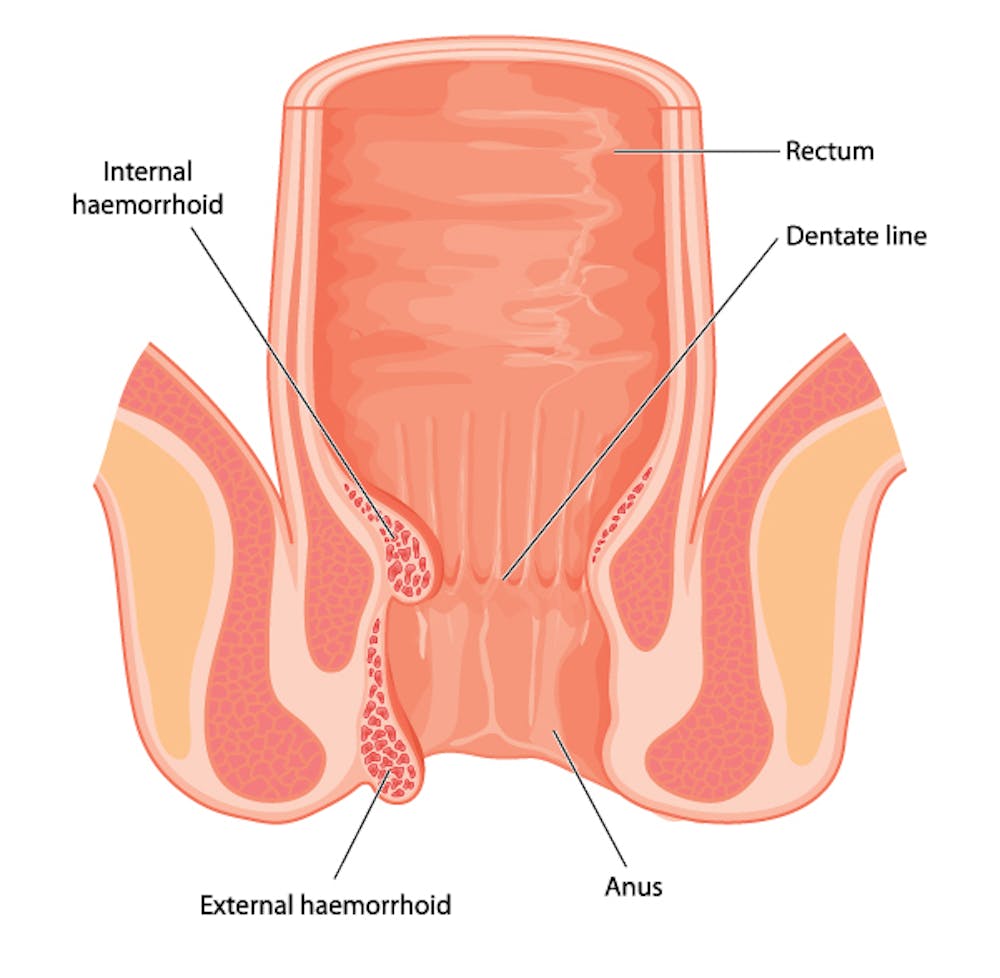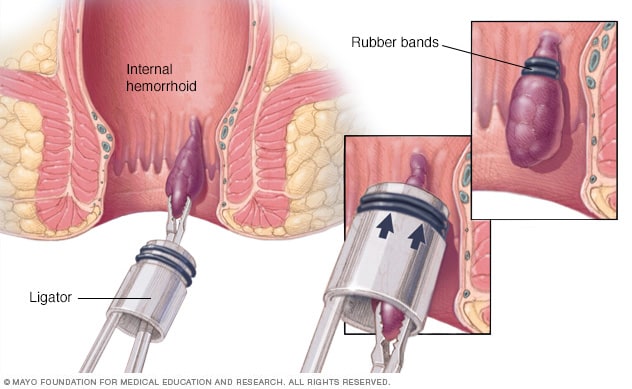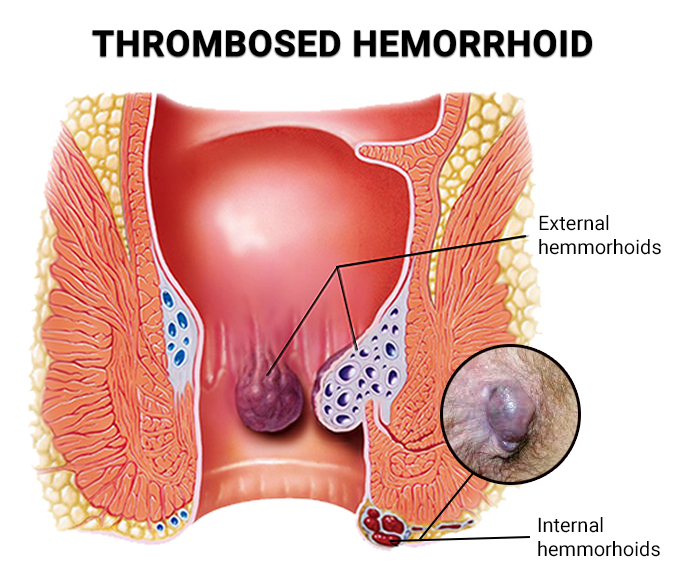Hemorrhoids, commonly referred to as piles, are swollen veins in the rectum and anus that can cause significant discomfort and distress. They are a prevalent issue that many people face at some point in their lives. The duration of hemorrhoids depends on their severity and lifestyle factors. Mild hemorrhoids may resolve within a few days with proper care, while severe cases might persist and require medical intervention.
At ColoWell America, we specialize in comprehensive hemorrhoid treatments tailored to your individual needs. Whether it is External or Internal Hemorrhoids our expert team is proficient in a range of advanced procedures:
- Rubber Band Ligation
- Thrombosed External Hemorrhoid Procedures
- Complex Hemorrhoid Surgery
- Transanal Hemorrhoidal Dearterialization
With our holistic approach, we aim to provide lasting relief and an improved quality of life for our patients. Contact us so we can assess and provide you the best care as per your condition.
Without appropriate treatment, hemorrhoids can last from a few days to several weeks. Severe hemorrhoids can cause intense pain, significant bleeding, and persistent discomfort. A burst hemorrhoid can lead to sudden bleeding and acute pain, necessitating immediate medical attention to avoid complications. If left untreated, hemorrhoids can result in chronic pain, continuous bleeding, anemia, and even infections or abscesses. Internal hemorrhoids typically cause painless bleeding, whereas external hemorrhoids are more likely to be painful and uncomfortable.

Symptoms
Severe Symptoms of Hemorrhoids:
- Intense pain
- Severe itching
- Significant bleeding
Internal vs. External Hemorrhoid Symptoms:
- Internal hemorrhoids: Painless bleeding
- External hemorrhoids: Pain and swelling around the anus
Early Signs of Hemorrhoids:
- Itching
- Mild discomfort
- Small lumps around the anus
Causes
Common Causes of Hemorrhoids:
- Straining during bowel movements
- Chronic constipation or diarrhea
- Pregnancy
Can Hemorrhoids Heal on Their Own?
- Mild cases can heal with proper care and lifestyle changes
Is it Okay to Live with Hemorrhoids?
- While managing mild symptoms is possible, seeking treatment is recommended to prevent complications
Treatment Options for Hemorrhoids
Hemorrhoids are classified into internal and external types. Internal hemorrhoids develop inside the rectum and are generally painless but can cause bleeding. External hemorrhoids form under the skin around the anus and can be painful and uncomfortable.
Rubber Band Ligation (RBL)
One of our primary treatments is Rubber Band Ligation. This minimally invasive technique involves placing a small rubber band around the base of the hemorrhoid, cutting off its blood supply. The procedure is quick, often painless, and offers the advantage of a faster recovery compared to traditional surgeries.

Rubber Band Ligation (RBL) is a minimally invasive procedure where a small rubber band is placed around the base of the internal hemorrhoid. This cuts off the blood supply, causing the hemorrhoid to shrink and fall off within a week.
- Minimally invasive
- Short recovery time
- Effective for internal hemorrhoids, especially those that bleed
Most patients can return to normal activities the next day, though some discomfort may be experienced for a few days. Complete healing typically occurs within one to two weeks.
Transanal Hemorrhoidal Dearterialization
We are proud to offer Transanal Hemorrhoidal Dearterialization. This cutting-edge procedure targets the hemorrhoidal arteries, reducing blood flow to the hemorrhoids and promoting their shrinkage. It’s a testament to our clinic’s dedication to staying at the forefront of medical advancements in the field.

Transanal Hemorrhoidal Dearterialization (THD) uses a Doppler ultrasound to locate the arteries supplying blood to the hemorrhoids. These arteries are then tied off to reduce blood flow, causing the hemorrhoids to shrink.
- Less invasive than traditional hemorrhoidectomy
- Can treat both internal and external hemorrhoids
- Aims to minimize pain and recovery time
Most patients can resume normal activities within a few days, with complete recovery taking up to two weeks. Pain is generally less compared to other surgical treatments.
Thrombosed External Hemorrhoid Procedure
For those suffering from painful external hemorrhoids, our Thrombosed External Hemorrhoid Procedure offers immediate relief. Our skilled practitioners ensure that the clot causing pain and swelling is carefully removed, providing patients with a swift return to comfort.

Transanal Hemorrhoidal Dearterialization (THD) uses a Doppler ultrasound to locate the arteries supplying blood to the hemorrhoids. These arteries are then tied off to reduce blood flow, causing the hemorrhoids to shrink.
- Less invasive than traditional hemorrhoidectomy
- Can treat both internal and external hemorrhoids
- Aims to minimize pain and recovery time
Most patients can resume normal activities within a few days, with complete recovery taking up to two weeks. Pain is generally less compared to other surgical treatments.
Complex Hemorrhoid Surgery
In cases where hemorrhoids are more severe or recurrent, our Complex Hemorrhoid Surgery, also known as hemorrhoidectomy, is the go-to solution. This procedure is designed for intricate intervention, ensuring that even the most challenging cases are addressed with precision and care.
Complex hemorrhoid surgery is a more invasive surgical option for severe or recurrent hemorrhoids that do not respond to other treatments. The procedure involves the surgical removal of hemorrhoidal tissue.
- Provides a permanent solution for severe hemorrhoids
- Can address both internal and external hemorrhoids
- Effective for large or thrombosed hemorrhoids
Considerations:
- Typically performed under anesthesia
- May involve a longer recovery period compared to minimally invasive treatments
The recovery time for complex hemorrhoid surgery can be longer, typically ranging from two to four weeks. Patients may experience more significant discomfort initially, but this decreases as healing progresses. Pain management and following post-operative care instructions are crucial for a smooth recovery
Frequently Asked Questions (FAQs)
A hemorrhoid can appear as a sudden onset painful lump that may be red, angry, and inflamed. Hemorrhoids can cause discomfort, swelling, rectal pain, anal discharge, and itching or irritation of the anus. These signs of hemorrhoids should not be ignored.
Watch out for these symptoms that may indicate you have hemorrhoids:
- Painful swelling
- Red marble-like growth or lump
- Sharp rectal pain
- Anal discharge
- Irritation and itching
- Rectal bleeding
Usually, symptoms last only a few days and there are plenty of effective ways to treat. Contact us for quick, painless, easy treatment for hemorrhoids – performed in-office. We offer solutions without need for surgery, except in the worst case scenarios.
ColoWell America’s gold standard RUBBER BAND LIGATION – a quick, non-surgical, in-office procedure with little to no pain or complications.
Rubber band ligation is preferred for hemorrhoids because of its effectiveness and affordability compared to other more invasive interventions and non-beneficial over-the-counter remedies.
How the treatment works:
- The treatment targets the blood vessel which feeds the hemorrhoid ligating the blood vessel and cutting off the blood supply to the hemorrhoid.
- The blood flow to the hemorrhoid is interrupted and it begins to shrink.
- Since the hemorrhoid has lost its connection with the feeding vessel, it continues to shrink and fall off during the 3-7 days following treatment.
Affordable, No time off necessary, No hospital visits. No need for special prep before procedure, Performed In Office In Minutes.
Rubber band ligation is the best treatment modality. Complications with banding are little to none. The procedure does not require surgery or a hospital visit, and you don’t have to take off work or require any difficult preparation!
To help prevent hemorrhoids and hemorrhoid recurrence you can eat more high fiber foods, including fruits, vegetables and whole grains. There are also fiber supplements like ColoFlax, Metamucil or Citrucel. Our doctor also recommends daily flax seed powder ingestion (2tbsp/day). You can also help prevent hemorrhoids by drinking four to six glasses of water a day and exercising regularly to help the bowels to move normally.
During pregnancy and delivery hemorrhoids can occur due to anal pressure, constipation, and pushing. Hemorrhoids are also commonly known as piles. It is recommended to eat fiber during pregnancy to avoid constipation, which can lead to hemorrhoidal issues. See a proctologist if you are suffering from hemorrhoids during or after pregnancy.
Internal hemorrhoids that prolapse and protrude can often cause bright red bleeding. Mostly this is painless bleeding seen on the toilet paper with wiping.
External skin tags or External hemorrhoidal tissue usually doesn’t cause bleeding. These external hemorrhoids can cause itching and problems with hygiene.
While hemorrhoids may not be cured with topical treatment, symptomatic relief from pain and itching can be obtained with over-the-counter creams such as Preparation H and Lidocaine, or prescriptions medications like Nifedipine cream.
Thrombosed hemorrhoids are blood clots in a hemorrhoid. This can result in itching around your anus, bleeding when you have a bowel movement, and swelling or lumps around the anus.
There are many causes of thrombosed hemorrhoids, including excessive straining with bowel movement when constipated, diarrhea, abnormal and irregular bowel movements, pregnancy and postpartum state, and prolonged sitting (for example, during travel, working at a desk, etc.)
We use rubber band ligation (RBL) as our standard for hemorrhoid surgery. The doctor places a small rubber band at the base of the hemorrhoid, which in result stops the blood supply and causes the hemorrhoid to shrink and fall off. A hemorrhoidectomy is another choice for hemorrhoid surgery. The procedure removes the hemorrhoid, blood clot and blood vessels. You may get partial anesthesia during this procedure and a hemorrhoidectomy is only performed for the most severe hemorrhoid cases.
How to treat hemorrhoids is based on a patient’s individual condition. Most cases require one to three appointments to prevent recurrence.
Many patients ask us: “Will the hemorrhoids go away on their own?”
The answer lies in the lifestyle choices you make following treatment.
Make FIBER a daily part of your diet. “Ground flax seed is an excellent source of fiber!” – Shiraz Farooq, MD
- Choose a plant-based diet to avoid constipation
- Be sure to drink four to six glasses of water throughout the day
- Avoid strenuous activities
Yes! Contact us to verify your eligibility for services. We also offer Self-Pay rates.
Submit your Suggestion





